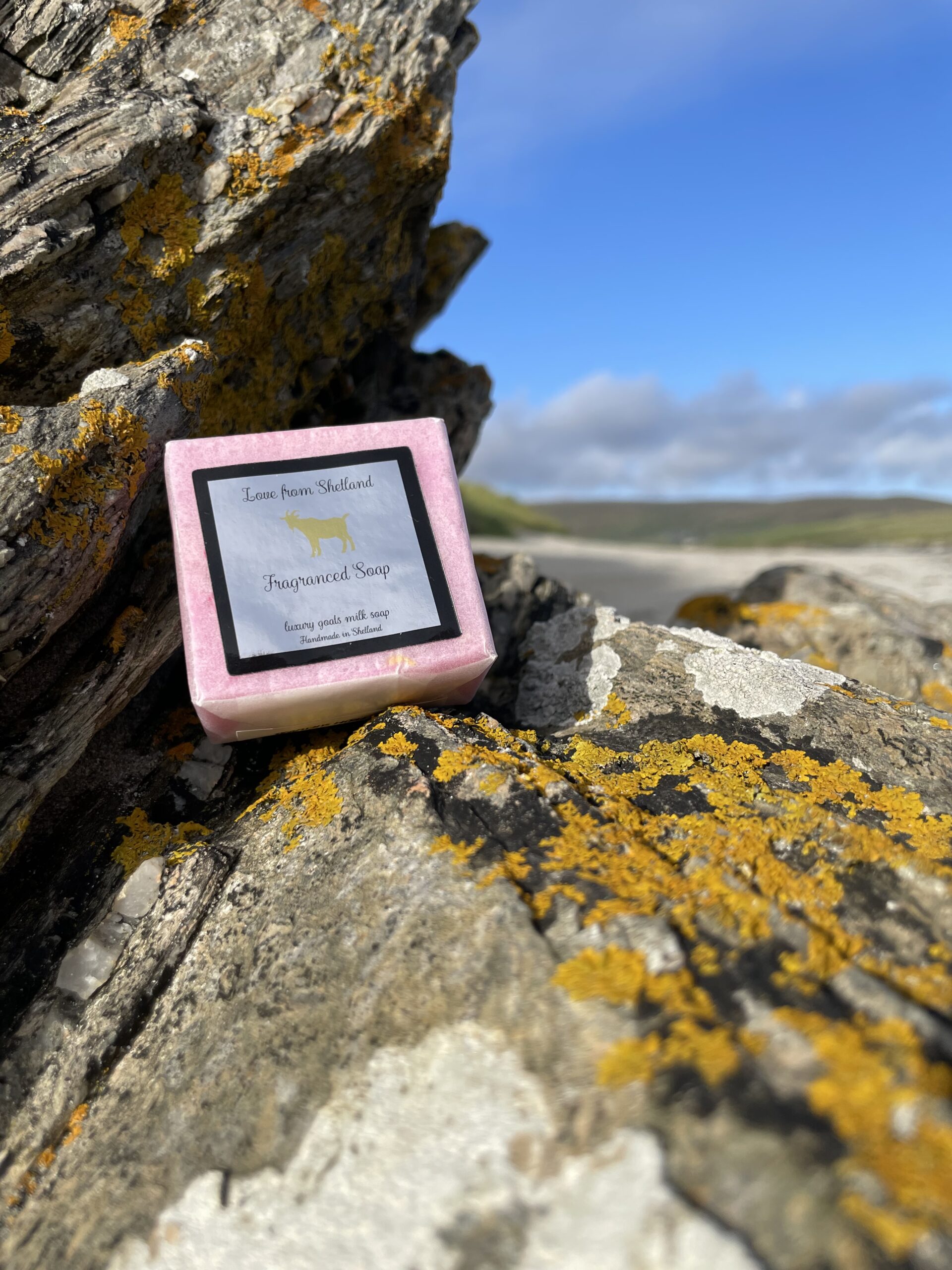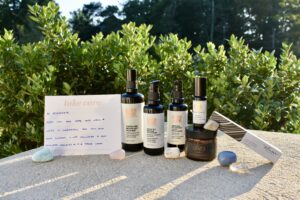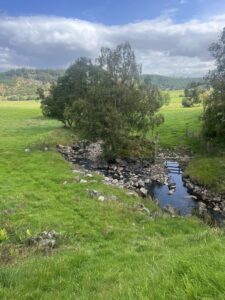Goats milk. It’s not the first thing one considers when it comes to skin care, but perhaps it should. While traveling around the beautiful isle of Shetland, I came across the most charming store in Lerwick. Nestled away on a cozy corner of Commercial Street, Love from Shetland immediately draws you in with scents of strawberry and sweet orange. Products tower in an organized fashion, from perfumes to bath bombs to their bespoke soaps, and these products all have one thing in common: goat‘s milk.
I had the pleasure of speaking with Esther, the founder of Love from Shetland. I found her smiling behind the counter, helping customers and asking them about their day. I had the opportunity to ask Esther some more in depth questions about her brand, and I look forward to sharing her story with you today.
Esther invited me to sit down with her behind the counter, where I asked her to start from the beginning.
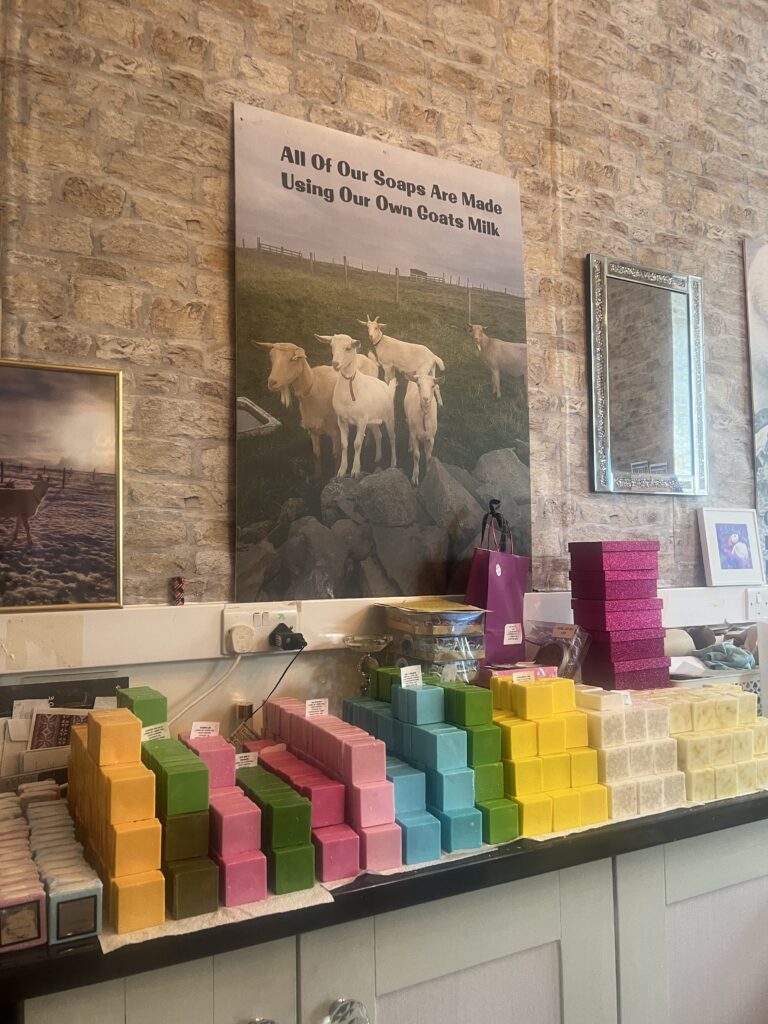
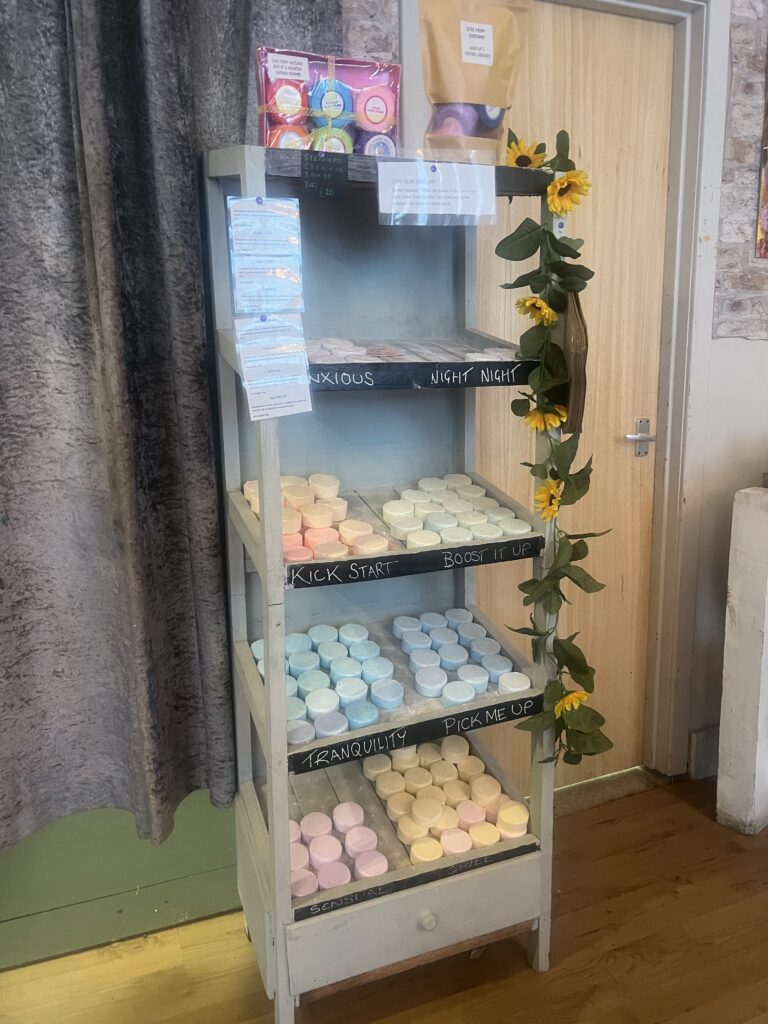
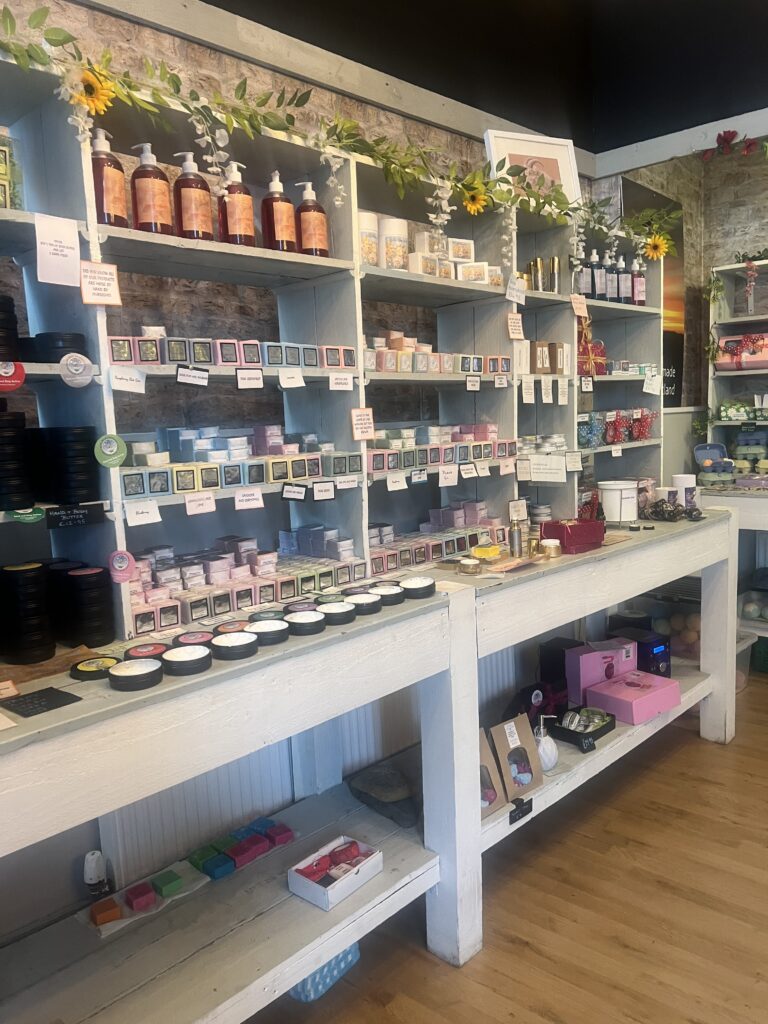
M (Miranda): So you make these goods yourself? Was there any particular reason why you wanted to start making these products?
E (Esther): Basically, what happened was my husband and I have goats on our farm, and we had lots of milk. And I looked at making cheese, but we didn’t have enough milk to do much with cheese. So then I looked at making soap. And I thought, most soaps are made with water, and water is actually the part of soap that can irritate your skin and dry it out. I thought, I wonder if I can make soap with milk. So then I started Googling it and looking it up. I found out that there were a total of two other businesses in the entire UK that made their products with goat’s milk. Then the more I read, the more I found out that goats milk has the closest pH to our skin. So it’s the perfect pH for our skin. All the goodness in the goat’s milk, our skin absorbs.
This is actually true. Not only does goat’s milk have the same pH as human skin, it also has a long history of use for skin care benefits. From Cleopatra to Queen Elizabeth I of England, bathing in goat’s milk has been a practice for centuries for supple, glowing skin. The lactic acid gently exfoliates the skin without damaging the acid mantle, and is naturally high in minerals, vitamins, and prebiotics. It is even rumored that the lactic acid in goat’s milk provided a “milk maiden glow”, as it was used by milkmaids to attain their luminous complexion.
M: So what makes the other ingredients in these soaps so important?
E: I looked up other soap ingredients in different brands and found that a lot of them were using palm oil, or frankly, other oils that aren’t doing much for your skin. You’re just making soaps that aren’t going to do anything. Because I didn’t want to waste the milk, instead I’m going to make something that’s going to do something for someone. So the first three soaps I made are the black currant seed oil, for eczema, the second one is the marula oil, and the third is the argan. It took me two years to do the black currant soap recipe.
M: Really? Two whole years?
E: I had psoriasis on my neck, so I used myself as a guinea pig. I kept having to tweak the recipe. And because the soap takes so long to dry, it took months — two months — between each batch, to try to see what was working. And I had to use it for a few weeks to see if it would do anything. Eventually, I made that one. *Esther motions to the black currant seed oil* And it went away! It just cleared, completely took away the psoriasis on the back of my neck.
M: And you still use it to this day?
E: Oh yes, yes. It’s never come back. And so I thought we’ve definitely got something with this one. This one works. Then marula was next. I thought the next one on the to-do list is a really, really moisturizing soap, for people who need a little bit more hydration in their skin.
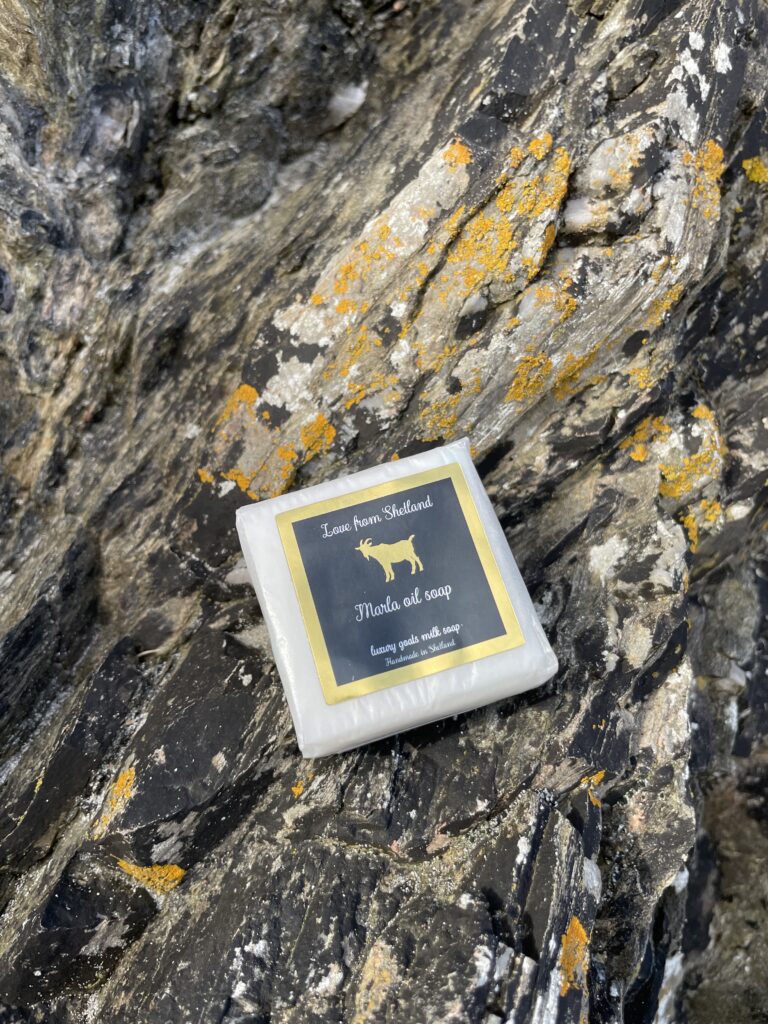
E: If you’re going to make a skin care product, if you’re going to do anything with skin care, you’ve got to make sure that what you’re putting into it is targeting specifically what you want to target. Right? So the likes of the black currant seed oil, contains neem oil, which will stop the scratching. It calms the redness. With the marula oil soap, ours comes from Africa, and the marula oil contains something like five times more vitamin C than an orange. So that’s an amazing oil to use. Now you see marula oil in a lot of skincare products.
Again, this is also true. The use of marula oil in skin care and body care products have skyrocketed in the past few years, but it has been used in skin care practices for centuries. Native to sub-Saharan Africa, the marula tree has been used by locals for hydration due to high levels of linoleic and oleic acids, which also soften and nourish the skin. As you may know, collagen and elastin are important for bouncy, hydrated skin, yet enzymes can break down both of these proteins over time. That’s where marula oil comes in. The antioxidants in marula oil, including the vitamin C Esther mentioned earlier, prevent the enzymes from breaking down these crucial proteins. In layman’s terms, marula oil has many anti-aging benefits.
Esther continues on to mention something I had never considered before, but found quite interesting.
E: If you think of an elephant’s skin, it really is quite soft and supple. Elephants have really good skin. And part of the reason why that is is because they eat the berries of the tree that produces marula oil. Some people take marula oil because of its high vitamin C content, and it’s anti-aging. Basically, it’s a target moisturization soap. The argan oil soap I make, believe it or not, is really good for oily skin. So the argan oil also has other oils in it, and it’s great for those with oily skin and for teenagers with acne. Anyway, after creating recipes, you’ve got to go to a chemist. I don’t know what it’s like in the States, but here in the UK, every time you bring in a new product, it’s got to go through a cosmetics safety assessment. Once they were assessed, I was able to sell them. So I was like, “Where am I going to sell them?” I started off at the wee shops here and there. I’d take a table there, I’d do it on a Saturday. I started that eight and a half years ago.
M: That’s amazing.
E: All I had was those three soaps. And it is so hard to get everything started. But then, people started coming and saying, that’s actually helped my skin. I started off with giving a lot away, to take them home, but it was more trying to get people to actually give the product a shot, to see if it would help them. And then they started coming back.
M: That’s wonderful to hear.
E: Then I started looking at making fragrant soaps. So I managed to find a company in the UK that makes fragrances that are additive free, SLS free, and paraben free. So we brought them out, started with six fragrances. That was good. I decided to focus more on the soap business. I persevered for about a year, and then I just kept money by. I saved up enough to get the rent and start a shop. Then, people just kept asking for more and more! So I just kept building it up, until we had more and more stuff. Basically that’s how it all came about.
M: Oh my, that is amazing.
E: Thank you. Now, we still use goats milk from our farm. I’m still the person that makes the products. It’s really good because it’s good doing something you like. Don’t get me wrong, every job has tough parts. And then we decided to put the products forward to get them Certified Palm Oil Free. And so, they all passed that assessment. So we are the first business in the whole of Scotland to have that certification.
M: Wow! Now that you mention it, I have seen palm oil quite frequently in ingredients lists over here.
E: They say it’s non-irritating, they say it’s from a good source, but it’s just not. Most palm forests are populated with orangutans. People will use it in soap because it’s a very cheap oil. So most people will use it, and they’ll buy it. But now, you find that most people don’t want to use it. Especially younger generations.
M: Younger generations are definitely becoming so much more environmentally conscious. It’s fantastic.
E: It is. It really, really is. I think that’s one of the bigger factors that brings people into our shop, is that they know it is palm oil free. They think, “that’s cool, you care.” So we’re very proud of that, that we don’t use palm oil.
M: Absolutely, you don’t need to. There are other options that are much better, for the planet and our skin.
E: Thank you, yes! I always say to my husband, I’m not trying to be a millionaire. As long as I can pay my bills, do what I’m doing, help people, I’m happy. The soap has been the same price that it was when I first started eight years ago. I’ve never raised it.
M: That’s amazing.
E: It is, but the worst part is the price of the oils go up. And I have to remember that soap is expensive for some people as well. So, you’re not going to make as much money by not raising the prices, but I’d rather not do that. The soaps on the shelf, they’re selling. *she smiles*
M: That’s wonderful! Now, are there any products that you absolutely love and would like to recommend?
E: Hm, let me see. Can you do fragrance?
M: I can.
E: Definitely the black currant soap, the body butters are lovely too. And the Eczema and Psoriasis Clay Face Mask. All you need to do is take a bit of powder and mix it with a couple drops of water. And the solid perfume.
M: Oh my goodness, it smells amazing.
E: This perfume doesn’t use any alcohol, unlike what you’ll get in any perfume that sprays. Are you still here on Sunday?
M: Yes, why?
E: We’re bringing one of the goats to the shop on Sunday. She’s five months old, and she raises money for the Lifeboat in Shetland. So far, she comes out when some of the cruise ships come to town. We always bring a goat in every year. She’s raised over £3,200 this summer for them. I’ll show you a wee photo of her.
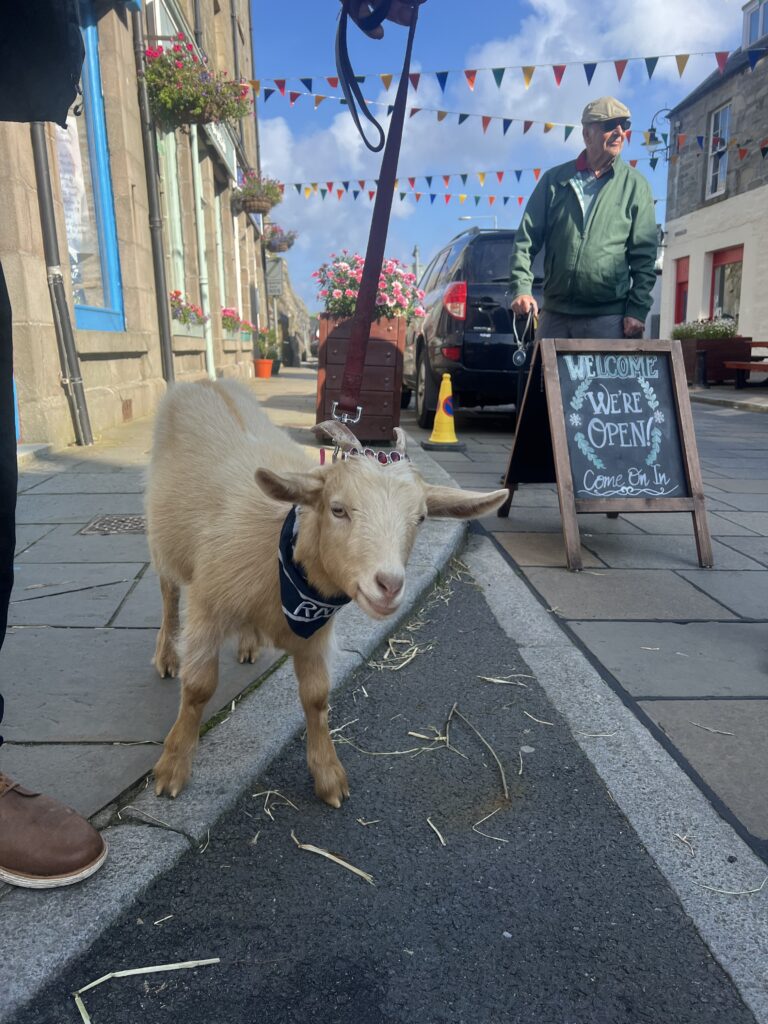
I did, in fact, go and meet the sweetest little goat I’ve ever had the pleasure of meeting. I truly hope you enjoyed my interview with Esther, and I invite you all to check out their amazing range of products. A huge thank you to Esther and the Love from Shetland team for all the work they have done, and continue to do. Stay tuned for my detailed reviews on some of Love from Shetland’s product line, coming soon!
https://www.lovefromshetland.com
All my love,
Miranda Renée
Some sources for you if you are curious about the magical powers of the ingredients mentioned in this interview:
https://www.ncbi.nlm.nih.gov/pmc/articles/PMC8197926
https://bmccomplementmedtherapies.biomedcentral.com/articles/10.1186/s12906-018-2112-1
